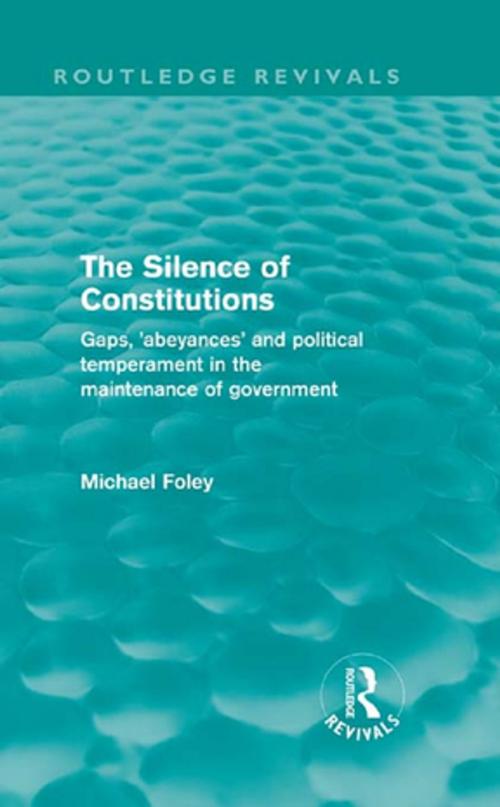The Silence of Constitutions (Routledge Revivals)
Gaps, 'Abeyances' and Political Temperament in the Maintenance of Government
Nonfiction, Social & Cultural Studies, Political Science, Politics, History & Theory| Author: | Michael Foley | ISBN: | 9781136498459 |
| Publisher: | Taylor and Francis | Publication: | January 11, 2013 |
| Imprint: | Routledge | Language: | English |
| Author: | Michael Foley |
| ISBN: | 9781136498459 |
| Publisher: | Taylor and Francis |
| Publication: | January 11, 2013 |
| Imprint: | Routledge |
| Language: | English |
First published in 1989, Michael’s Foley’s book deals with the ‘abeyances’ present in both written and unwritten constitutions, arguing that these gaps in the explicitness of a constitution, and the various ways they are preserved, provide the means by which constitutional conflict is continually postponed. Abeyances are valuable, therefore, not in spite of their obscurity, but because of it.
The author illustrates his point with analyses of constitutional crises from both sides of the Atlantic. He examines the period leading up to the English civil war in the seventeenth century, and the ‘imperial presidency’ episode under Richard Nixon in the late 1960s and 1970s in the USA. In both cases there was no constitutionally correct solution available but, as the author demonstrates, the political skill of the participants in their use of constitutional devices allowed the anomalies of the American system to survive in a way that contrasted markedly with the plight of Charles I and the Stuart constitution. This reissue of a landmark study will be welcomed by all those interested in the interpretation and construction of constitutional law.
First published in 1989, Michael’s Foley’s book deals with the ‘abeyances’ present in both written and unwritten constitutions, arguing that these gaps in the explicitness of a constitution, and the various ways they are preserved, provide the means by which constitutional conflict is continually postponed. Abeyances are valuable, therefore, not in spite of their obscurity, but because of it.
The author illustrates his point with analyses of constitutional crises from both sides of the Atlantic. He examines the period leading up to the English civil war in the seventeenth century, and the ‘imperial presidency’ episode under Richard Nixon in the late 1960s and 1970s in the USA. In both cases there was no constitutionally correct solution available but, as the author demonstrates, the political skill of the participants in their use of constitutional devices allowed the anomalies of the American system to survive in a way that contrasted markedly with the plight of Charles I and the Stuart constitution. This reissue of a landmark study will be welcomed by all those interested in the interpretation and construction of constitutional law.















